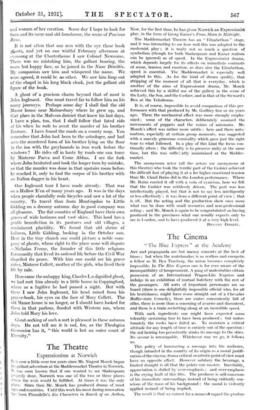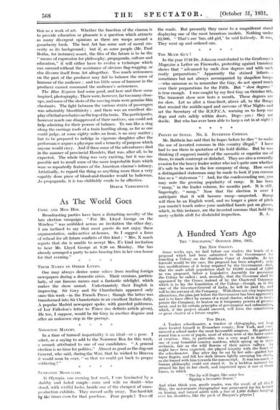The Cinema
" The Blue Express " at the Academy
ART and propaganda are but uneasy consorts at the best of times ; but when the matchmaker is as restless and energetic a fellow as M. Ilya Trauberg, the union becomes completely impossible. In The Blue Express one is for ever aware of the incompatibility of temperament. A gang of undesirables obtain possession of an International Wagon-Lits Express and indulge in an exhibition of mutual butchery with the rest of the passengers. All sorts of important personages are on board (there is one delightfully impossible official who, for all his brutishness, might have come straight out of a Chevalier Buffer-state Comedy), there are crates conveniently full of rifles, there is more than a seasoning of avarice and discontent, and there is a train rocketting along at an incredible speed.
- With such ingredients one might have expected some tolerably sustaining fare to have been produced ; but unfor- tunately the cooks have failed us. To maintain a critical attitude for any length of time is entirely out of the question : the red herring too persistently stinks its message to the skies. Its savour is unescapable. Whichever way we go, it follows us.
This policy of hammering a message into the audience, though intended in the country of its origin as a moral justifi- cation of the cinema, froma critical or artistic point of view must have an opposite effect. However salutary the beverage, a limited draught is all that the palate can master. Inevitably, appreciation is dulled by over-emphasis : and over-emphasis is the crying fault of this film. The producer is self-conscious of his immediate surroundings instead of being critically con- scious of the mass of his background : the moral is violently applied instead of being implied.
The result is that we cannot for a moment regard the produc- tion as a work of art. Whether the function of the cinema is to provide education or pleasure is a question which attracts as many divergent opinions as there are wasps around a gooseberry bush. The best Art has some sort of moral sin- cerity as its background ; but if, as some people (Mr. Paul Rotha, for instance) assert, the. film of the future is to be the means of expression for philosophy, propaganda, culture and education," it will either have to evolve a technique which can succeed without the assistance of obvious flag-wagging, or else divorce itself from Art altogether. Too much seriousness on the part of the producer may fail to balance the sense of humour of the audience : and too little sense of humour in the producer cannot command the audience's seriousness.
The Blue Express had some good, and here and there some inspired, photography. There were, however, far too many close- ups, and some of the shots of the moving train were genuine film chestnuts. The fight between the various strata of passengers was admirably bloodthirsty ; and there was an excellent dis- play of lethal acrobatics on t he top of the train. The participants, however much one disapproved of their motives, one could not help admiring for their powers of balance. To run like a stag along the carriage roofs of a train hurtling along, as far as one could judge, at some eighty miles an hour, is no easy matter ; but to be prepared to indulge in vigorous slaughter after the performan2e argues a physique and a tenacity of purpose which anyone would envy. And if then some of the adventurers died in the manner of provincial Hamlets, that was, after all, to be expected. The whole thing was very exciting, but it was im- possible not to recall some of the more improbable feats which were so repeatedly features of the American cinema's infancy. Artistically, to regard the thing as anything more than a very capably done piece of blood-and-thunder would be ludicrous. As propaganda, it is too childishly crude to be effective.
DEREK VERSCHOY LE







































 Previous page
Previous page